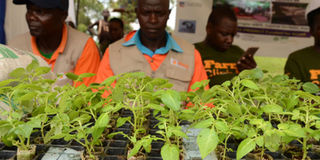Eastern Uganda farmers get tips on climate smart agriculture

Michael Bosli a potato seed producer from Kween, exhibits rooted apical cuttings at the Farm Clinic held at Bulengeni last Saturday. Uganda is using the technology to enhance food security Photo/ George Katongole
Farmers are always looking for reliable information on sustainable agriculture, how to get started in farming, how to access loan facilities, and how to pursue profitable niche markets.
The answers to these and many other similar questions were available from the during the 18th edition Seeds of Gold Farm Clinic at Buginyanya Zonal Agricultural Research and Development Institute (BugiZARDI) in Bulengeni, Bulambuli District last Saturday.
The Farm Clinic put emphasis on eight enterprises including; wheat and barley, which adapt well in highlands, maize, potatoes, banana, Arabica coffee, goat rearing, aquaculture and dairy farming.
Resourceful
Banana and coffee growing attracted the biggest number of participants who keenly sought ideas on best practices. Some farmers expressed concern over market availability while financing was an issue too. Yet there were experts at hand to offer the answers.
Agronomists from BugiZARDI offered all the answers while partners like Bank of Uganda, Stanbic Bank and Agricultural Business Initiative (aBI) offered insights into how to go about financing hurdles.
Bank of Uganda Principal Budget Analyst Sarah Mubuke Nantongo demystified agricultural financing saying it has never been easier through the Agriculture Credit Fund (ACF).
“Farmers qualify to get working capital, to be able to produce yet they can acquire loans to purchase silos and mills for value addition,” Mubuke said.
ACF is available in partner banks, Microfinance deposit taking institutions and credit institutions.
She stressed that these facilities are accessible to anyone including individuals, partnerships and saccos with favourable interest rate of 12 per cent.
Worthy cause
BugiZARDI is attempting to recover from the 2011 tribal clashes between the Bamasaba and the Shanaa. Most of the facilities still do not have roofs since the attacks and The Farm Clinic was therefore a bonding activity for the community where people in excess of 1,000 attended the camp.
Dr Lawrence Owere, the director of BugiZARDI said the opportunity to host farm clinics must be taken with open arms.
“This is a great concept because it offers an opportunity to farmers that rarely come to us voluntarily to get the desired knowledge,” Dr Owere said.
Bulengeni marked the last Farm Clinic to be organised in 2019 following others that were held in four regions: south west in Hoima and Mbarara; south Buganda in Masaka and Mukono; and Lira in northern Uganda.
The Farm Clinic is an initiative of the Nation Media Group (NMG) to address challenges of climate change by bringing farmers and agricultural scientists together.
It is organised in conjunction with the National Agricultural Research Organisation (Naro), Bank of Uganda, Stanbic Bank and aBI. There were exhibitors too from Solar Now, MTK and Koudjis, among others, who brought their solutions to the farmers.
New technologies
With the need to improve farming growing day by day, researchers have continuously sought new means.
The most outstanding innovation at Bulengeni was the rooted apical cuttings. This technology relies on taking cuttings from potato plantlets by taking node cuts from lateral shoots rather than allowing tissue culture plantlets to mature and produce minitubers.
Micahel Bosli, a potato seed producer from Kween District who was at the Farm Clinic, said apical cuttings will boost potato growing.
The technology made its way in Uganda this year courtesy of the International Potato Centre (CIP). Among the many benefits, the seed is certified clean yet seeds are cheaper, each costing Shs500, compared to planting tubers.
He estimates about 400 tubers being enough for an acre as opposed to eight bags of tubers in the same land area.
Advice
Bank of Uganda Principal Budget Analyst Sarah Mubuke Nantongo demystified agricultural financing, saying it has never been easier through the Agriculture Credit Fund (ACF). “Farmers qualify to get working capital, to be able to produce yet they can acquire loans to purchase silos and mills for value addition,” Mubuke said.



